Editorial
A crying shame!
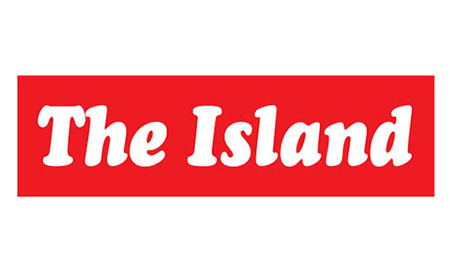
Thursday 26th November 2020
Male MPs, wearing as they did their hearts on their sleeves, yesterday, wept buckets for hapless women who suffered harassment and violence at the hands of savages who call themselves ‘men’. They made themselves out to be knights errant in shining armour on a mission to help those in trouble, especially damsels in distress. They did so when Opposition Leader Sajith Premadasa brought to the notice of the House an incident where a female worker had been assaulted by one of her male counterparts, in a government office, in Gampaha. All of them condemned the incident, with one voice, and stressed the need for safeguarding the rights of women, and rightly so. But is their concern for women genuine? This is the question one must have asked oneself on seeing them shed copious tears for the female assault victim. If they really do, why has none of them called for an end to the shameful practice of governments imposing taxes on women’s hygiene products?
Rohini Kaviratne, one of the few female members of the current Parliament, has taken up the issue of heavy taxes on sanitary towels, according to a news item we published yesterday. She deserves praise, but, sadly, she has not received any support from her male counterparts who pretend to be sisters under the skin.
The despicable sanitary towel tax has been there for years despite protests. Are Sri Lankan governments so broke as to augment their revenue with taxes on this essential sanitary product?
Women account for more than one half of the Sri Lankan population although they have not realised their power, which can make or break governments. Besides, the Sri Lanka economy is dependent on women who are slaving away on estates, in garment factories and in West Asia. They deserve a much better deal.
Urban spaces which used to be eyesores have been yuppified, and infrastructural development is discernible in various parts of the country. These gentrification and development projects may go on, but we must not lose sight of the seamy side of ‘the paradise’.
Most schools are without proper sanitation facilities. Research findings have revealed that many girls stay at home during their periods as they lack access to toilets in their schools, as we have mentioned in a number of previous comments. One may recall that more than one half of adolescent Sri Lankan girls, surveyed by UNICEF and the government of Sri Lanka in 2015, revealed that they did not attend school during their periods.
The education sector is now in the hands of two eminent scholars—Education Minister Prof. G. L. Peiris, a legal brain, and Secretary to the Education Ministry, Prof. Kapila Perera, an engineering brain. Both are former Vice Chancellors who have interacted with students sufficiently and are au fait with their problems. It is hoped that the brainy duo will, together with the government leaders, ensure that every seat of learning will have proper sanitary facilities, and menstruation will not prevent any girl from attending school.
Mangala Samaraweera, credit where credit is due, was considerate enough to reduce taxes on sanitary towels when he was the Finance Minister in the yahapalana government. He went on record saying that access to affordable female hygiene products was expected to have an important positive impact on girls’ school attendance and educational outcomes. He was spot on.
We have a female health minister, but she does not seem concerned about issues women are faced with. Let Health Minister Pavithra Wanniarachchi be urged to stop engaging in exercises in absurdity such as dropping pots into rivers in a bid to banish coronavirus, and prevail on the government to make female hygiene products tax free.
It defies comprehension why female hygiene products cannot be made tax free, in a country, where widespread waste is the norm, and tax exemptions are given to politicians. The government must abolish taxes on such essential products; it may recoup any losses resulting therefrom by increasing taxes on firewater and coffin nails aka cigarettes.
Editorial
Draining Diyawanna swamp

Thursday 21st November, 2024
The JVP added Sinhala slang, jilmaat, meaning trickery, to Sri Lanka’s political lexicon, after the 2010 presidential election; it claimed that the then President Mahinda Rajapaksa had secured a second term by means of a computer jilmaat, but it could not prove that allegation. However, there have been numerous instances of legislative and constitutional jilmaat in this country, and they are responsible for the rapid rise of anti-politics. Veteran leftist and former Cabinet Minister D. E. W. Gunasekera has, in a brief interview with The Island, pointed out how a questionable constitutional amendment has been gnawing away at public trust in the electoral process since 1989.
A report in this newspaper yesterday quoted DEW as having said that the 14th Amendment, which inserted Article 99A into the Constitution, in 1988, providing for the appointment of defeated candidates as National List (NL) MPs, was different from the original Bill approved by a Parliamentary Select Committee (PSC). He has said the then Prime Minister Ranasinghe Premadasa, who headed the PSC at issue, himself revealed that fact during a parliamentary debate, but no remedial action was taken.
The deplorable practice of appointing defeated candidates to Parliament is violative of the people’s franchise, and a Bill containing such provision would not have survived judicial scrutiny, and therefore it is possible that the J. R. Jayewardene government resorted to some constitutional jilmaat to secure the passage of the 14th Amendment with the questionable section.
No government has cared to amend Article 99A in spite of their much-avowed commitment to democratic best practices. All political parties have shamelessly used this constitutional provision to smuggle in defeated candidates into Parliament. As long as Article 99A remains unchanged, it will not be possible for the people to get rid of any MP by defeating him/ her in a general election if he/she is in the good books of his/her party leader and his/her party polls enough votes to secure NL slots. Even the JVP-led NPP, which pontificates ad nauseam about democracy, morals and ethics, has appointed defeated candidates as NL MPs. Two of its 159 members in the new Parliament are candidates rejected by the people in last week’s election. The New Democratic Front is embroiled in a dispute over its two NL slots which a large number of its defeated candidates are said to be eyeing.
It is also possible for political party leaders to engineer NL vacancies to appoint anyone of their choice as an MP owing to Section 64 (5) of the Parliamentary Elections (Amendment) Act passed in 1988. All political parties have made use of this despicable legal provision to make NL appointments. Such reprehensible laws have come to stay because once they are ratified by Parliament, they become faits accomplis owing to the absence of legal provision for the post-enactment judicial review of legislation, the need for which cannot be overstated in a country like Sri Lanka, where governments do not respect even the entrenched clauses in the Constitution. It may be recalled that in January 2024, the Rajapaksa-Wickremesinghe government, which bulldozed its way through, arbitrarily declared that its draconian Online Safety Bill had been passed amidst a noisy protest in the House. In 2017, the Provincial Council Elections (Amendment) Bill was passed in a questionable manner, with some sections incorporated into it at the committee stage to postpone the PC polls on the pretext of increasing female representation. It was a typical Christmas Tree Bill, which was substantially different from the Bill gazetted, tabled in Parliament and examined by the Supreme Court. Sadly, yet unsurprisingly, all political parties represented in Parliament at the time voted for that bad Bill, enabling its passage with a two-thirds majority!
The onerous task of draining the Diyawanna swamp, which the NPP has undertaken to perform, should not be limited to ridding the legislature of undesirables; Parliament must also be made to right the wrongs it has committed under previous governments if public trust therein is to be restored. Let the NPP government be urged to use its supermajority to amend Article 99A and Section 64 (5) of the Parliament Election Act as a national priority to prevent the appointment of defeated candidates and those who are neither unsuccessful candidates nor NL nominees as MPs. Similarly, urgent action should be taken to enable the post-enactment judicial review of legislation. That is the least the self-righteous JVP/NPP leaders can do to atone for the sin of having appointed defeated candidates as NL MPs. No clean-up of Parliament will be complete unless the new government takes action to safeguard the people’s franchise, which is the bedrock of democracy.
Editorial
Kiri-Kekiri dilemma and need for austerity

Wednesday 20th November, 2024
The JVP-led NPP asked for a mandate to clean up Parliament, and received a mammoth majority for that purpose. Its stalwart bragged that they had asked for brooms but the people had given them bulldozers. A fish is said to rot from the head down, and therefore Parliament has to be cleansed as a national priority. Let the clean-up begin!
One can only hope that the latest regime change will not lead to another false dawn like the one described in Orwell’s dystopian novella, Animal Farm, where the Pigs, after a successful revolt, decree that ‘all animals are equal, but some animals are more equal than others’. The new MPs and ministers must not be allowed to place themselves above the public and lead the life of Riley. After all, that is what the NPP promised during its presidential and parliamentary election campaigns.
In the late 1980s, during its second uprising, the JVP coined a pithy slogan to mobilise the rural youth against the UNP government of the day, by highlighting a glaring urban bias in resource allocation—kolombata kiri, gamata kekiri (‘Milk for Colombo and kekiri cucumbers for the village’). Under a JVP-led government no room should be left for the people to say ‘methi-amathilata kiri, janathawata kekiri—‘milk for MPs and ministers, and kekiri for the public’.
Indiscipline, corruption, violence, brawls, dereliction of duty, waste, and the MPs’ privileges and perks were the key factors that turned public opinion against Parliament to the extent of a mob led by the JVP trying to march on it in 2022. The JVP, which failed to give Parliament a shake-up with bombs and mobs, and its alter ego, the NPP, are now in a position to achieve that goal democratically. Everything possible must be done to reduce the cost of maintaining Parliament and its members.
SJB MP Hesha Withanage has made a very progressive suggestion, which should have come from the JVP/NPP; he has urged the new government to make all MPs and ministers serve the public on a voluntary basis. The MPs’ official residences in Madiwela are being repaired at a massive cost to accommodate the members of the 10th Parliament, we are told. Addressing the media, yesterday, MP Withanage demanded that the MPs’ housing scheme be handed over to a university which lacks hostel facilities for its students. He said so during the last Parliament as well and his position on curtailing state expenditure on maintaining Parliament and the MPs has been consistent.
Withanage has also called for an end to the practice of providing the MPs with heavily subsidised meals in parliamentary canteens. It is doubtlessly unfair to pamper the MPs while the people who voted for them are struggling to dull the pangs of hunger. Secretary General of Parliament Kushani Rohanadheera, taking part in a television programme the other day, sought to pooh-pooh the claim that the MPs partake of sumptuous meals at ludicrously low prices in the parliamentary canteens, where, she claimed, only ordinary dishes were served. If so, let the menus and the expenditure on victuals served in the parliamentary restaurants during the past six months or so be made public so that the people will know whether their representatives have been eating bandakka and kekiri, as Rohanadheera has claimed.
It is puzzling why the NPP has appointed a 21-member Cabinet to do what three ministers had done for nearly two months. It would have made sense if about 15 ministers had been appointed with an equal number of deputy ministers. When the delayed Provincial Council elections are held, there will be 45 ministers in the provinces. Sectors such as health and education will have 10 ministers each—the Cabinet minister and nine provincial ministers. Sri Lankans are paying through the nose to maintain a bloated state service; there is a public official for every 14 citizens!
A country, which is in the throes of a crippling economic crisis and has defaulted on its debt, cannot afford to provide its MPs and ministers with perks that would make even their counterparts in the developed world turn green with envy. MP Withanage is right in having demanded that the MPs must not be given vehicles at the expense of the public. The most effective way to develop public transport is to make the people’s representatives share in commuters’ hardships by travelling in crowded buses and trains. Then only will they really feel the need to solve the chronic transport issues. The new government, as we have said in a previous editorial comment, should adopt the Swedish model in providing the MPs with facilities. In Sweden, only the Prime Minister is given an official car, and all others including the Speaker receive bus and train passes. They are free to use private vehicles but at their own expense.
The JVP-led government ought to manage state funds frugally, launch an austerity drive, lead by example and usher in national progress for the sake of the people, who answered its clarion call for action. The JVP should live up to its ‘anthem’, which its founder Rohana Wijeweera sang with gusto at party events to energise his supporters:
Kusata sagini/Hadata sogini/Gathata veraheli/Kebeli ella/sathuta senasuma ahimi karalu/Andura dinu kalaya gihilla/Nositha meri meri sathurpayata vakutu vee atha paya hakulla/Negitapalla, negitapalla/Numbalage kalaya evilla.
(Roughly rendered into English, it means that gone is the dark era when you suffered under enemy feet, in rags and on empty stomachs with hearts filled with sorrow; rise awake, your turn has come!)
Editorial
Close that smuggling tunnel

Tuesday 19th November, 2024
The NPP, the ITAK and the Sarvajana Balaya have appointed defeated candidates to Parliament via the National List (NL), making a mockery of their much-avowed commitment to democratic best practices. This has been the name of the game in Sri Lankan politics all these years and one of the main reasons for the erosion of public trust in the electoral process.
The NPP deserves praise for the appointment of a person with a visual disability to Parliament for the first time in Sri Lanka’s parliamentary history. It has fulfilled a long-felt need. Sadly, it has added not just a smidgeon but a scoop of cow dung to the proverbial pot of milk by appointing two of its defeated candidates as NL MPs.
It is said that in this country, in times of yore, some men were tricked into marrying not-so-attractive elder sisters of the women they were betrothed to. Times have changed and this kind of trickery is no longer heard of in matrimonial affairs, but a similar practice prevails in Sri Lankan politics; individuals other than those presented as NL nominees to electors are appointed MPs, and, worse, even total outsiders are brought in to fill NL vacancies, which are often created artificially.
Strangely, the Constitution and the Parliamentary Elections Act provide for undermining the people’s franchise in this despicable manner. As we have pointed out in previous editorial comments, Article 99A of the Constitution allows ‘the persons whose names are included in the lists submitted to the Commissioner of Elections … or in any nomination paper submitted in respect of any electoral district by political parties or independent groups at that election’ to be appointed to Parliament via the NL. In 1988, the then UNP government introduced Section 64 (5) of the Parliament Election Act, inter alia, as an urgent Bill, eroding the essence of the constitutional provisions pertaining to the NL.
The Parliamentary Elections Act of No 1 of 1981, as amended in 1988, allows ‘any member’ of a political party to be appointed to fill an NL vacancy. After parliamentary elections, political parties appoint their NL members, as prescribed by the Constitution, and thereafter engineer NL vacancies to bring in persons of their choice as MPs. It is not possible to have this highly undemocratic practice terminated by judicial means because there is no constitutional provision for the post-enactment judicial review of legislation. This ‘smuggling tunnel’, as it were, must be closed by Parliament itself.
Worryingly, it has now been revealed that the words, ‘any member’, were surreptitiously incorporated into the Parliamentary Elections (Amendment) Act after its ratification by Parliament in 1988!
Not everything the Constitution and other laws provide for is morally right and acceptable. The 18th constitutional amendment, which enhanced the executive powers of the President and removed the presidential term limit, had to be abolished because it was found to be detrimental to democracy. The 20th Amendment to the Constitution was done away with on the same grounds. Therefore, the flawed legal provisions that undermine the people’s franchise and sovereignty must be scrapped without further delay.
We suggest that Article 99A of the Constitution be amended to scrap the phrase, ‘in any nomination paper submitted in respect of any electoral district by political parties or independent groups’, and the words, ‘any member’ be removed from the Parliamentary Elections Act. This is something the NPP, which came to power, promising good governance, ought to do on a priority basis.
Given the shameful NL appointments at issue, it may not be difficult to imagine what the situation would have been if there had been no preferential vote mechanism; political party leaders would have had carte blanche to ensure the entry of unsuccessful candidates in their good books into Parliament at the expense of the deserving ones against the will of the people. That would have led to what is called the dictatorship of party leaders. Needless to say, an electoral process based on the proportional representation system without provision for voters to indicate their preferences for candidates will be antithetical to democracy. Hence the need to defeat efforts being made in some quarters to abolish the preferential vote.
-
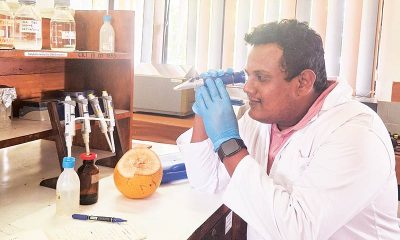
 Life style5 days ago
Life style5 days agoKing of coconuts heads for a golden future
-
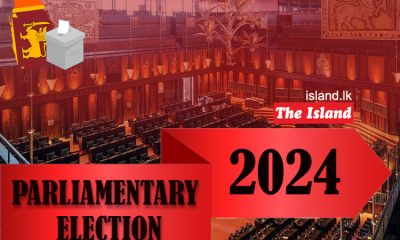
 Latest News6 days ago
Latest News6 days agoColombo district preferential votes announced
-
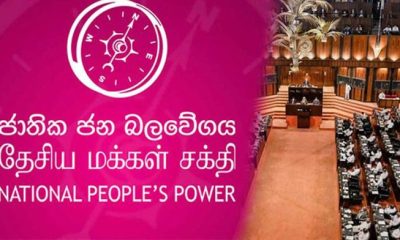
 News4 days ago
News4 days agoNPP appoints two defeated candidates as NL MPs
-
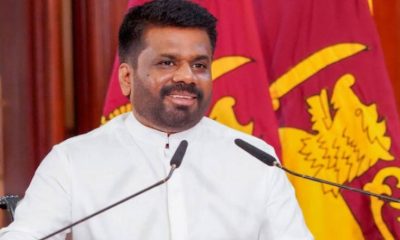
 News6 days ago
News6 days agoPresident warns his party: “We will fail if we view power as an entitlement to do as we please”
-
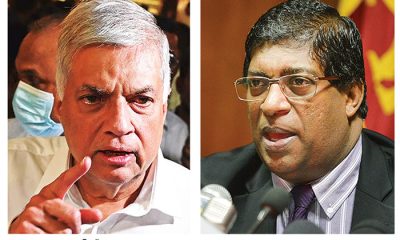
 News3 days ago
News3 days ago‘Gas Cylinder’ explodes; Ranil flays NDF Secy. for submitting Ravi’s name
-
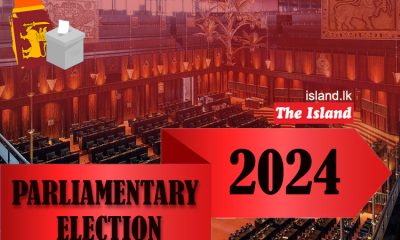
 Latest News7 days ago
Latest News7 days agoGampaha district: NPP 16, SJB 3
-
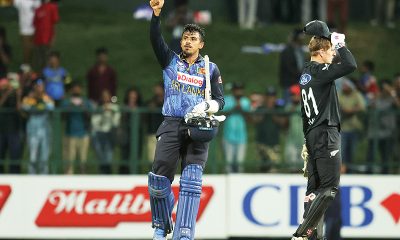
 Sports3 days ago
Sports3 days agoMaking batting compulsory for bowlers has worked – Theekshana
-

 Editorial6 days ago
Editorial6 days ago‘Maroon Wave’ and AKD Magic











